Pakistan killings near Peshawar disrupt polio campaign
- Published
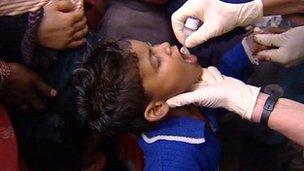
Bruce Aylward, World Health Organisation: Attacks "absolutely horrific"
Two polio vaccination workers have been killed in north-western Pakistan in the latest of a spate of deadly attacks.
The shootings in the Peshawar region left a vaccination supervisor and her driver dead, and injured a volunteer.
The deaths brought to eight the number of health workers killed in this week's anti-polio drive. The three-day drive is now over.
No group has claimed responsibility, but the Taliban have issued threats against the UN's anti-polio efforts.
The militants have accused health workers of working as US spies and say the vaccine makes children sterile.
Pakistan is one of just three countries where the disease is still endemic.
Coming after five deaths on Tuesday, and one on Monday, the UN children's agency Unicef and the World Health Organisation halted work in Sindh province in the south and Khyber Pakhtunkhwa in the north-west on Tuesday. The suspension was extended nationwide on Wednesday.
The UN provides technical and financial support to employees and volunteers of the local health departments who administer the polio drops.
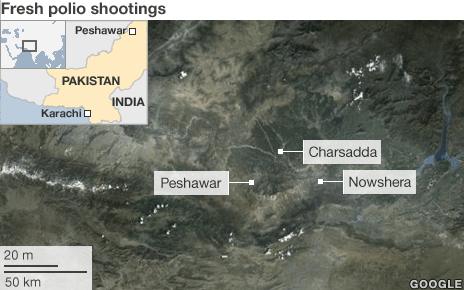
Despite the killings, the immunisation drive continued in some areas on Wednesday - although a number of local health workers refused to go out, Reuters news agency reported.
'We risk our lives'
In Wednesday's violence, the vaccination supervisor and her driver died when their car was sprayed with bullets by gunmen riding motorbikes in Charsadda district, north-east of Peshawar, police said.
The student volunteer was shot in the head and critically injured when gunmen on two motorbikes fired at a team of vaccinators in a northern suburb of Peshawar.
Gunmen riding motorbikes also shot at polio vaccinators in another area of Charsadda and in the adjoining district of Nowshera, although no injuries were reported.
On Tuesday, four female health workers were shot dead in the space of 20 minutes in Karachi, and a fifth woman died after being shot in Peshawar. A day earlier a male health worker working on the anti-polio drive was also killed in Karachi, although police have suggested other factors may also lie behind his death.
Correspondents say the authorities were caught off guard by the violence - until now most attacks on health workers have taken place in north-western areas near militant strongholds.
At a rally in Islamabad, health worker Ambreen Bibi told Reuters: "We go out and risk our lives to save other people's children from being permanently handicapped, for what? So that our own children become orphans?"
Wednesday was the final day of a three-day nationwide anti-polio drive - during which an estimated 5.2 million polio drops were to be administered.
There has been opposition to such immunisation efforts in parts of Pakistan, particularly after a fake CIA hepatitis vaccination campaign helped to locate Osama Bin Laden in 2011.
Militants have kidnapped and killed foreign NGO workers in the past in an attempt to halt the immunisation drives, which they say are part of efforts to spy on them.
Afghanistan and Nigeria are the only other countries where polio is still endemic.
Pakistan is considered the key battleground in the global fight against the disease, which attacks the nervous system and can cause permanent paralysis within hours of infection.
Almost 200 children were paralysed in the country in 2011 - the worst figures in 15 years.
Earlier this year, the Global Polio Eradication Initiative warned that tackling the disease had entered "emergency mode" after "explosive" outbreaks in countries previously free of polio.
The World Health Organization said polio was at a tipping point, with experts fearing it could "come back with a vengeance" after large outbreaks in Africa and Tajikistan, and China's first recorded cases for more than a decade.
Declaring polio a national emergency, the Pakistani government is targeting 33 million children for vaccination with some 88,000 health workers delivering vaccination drops.
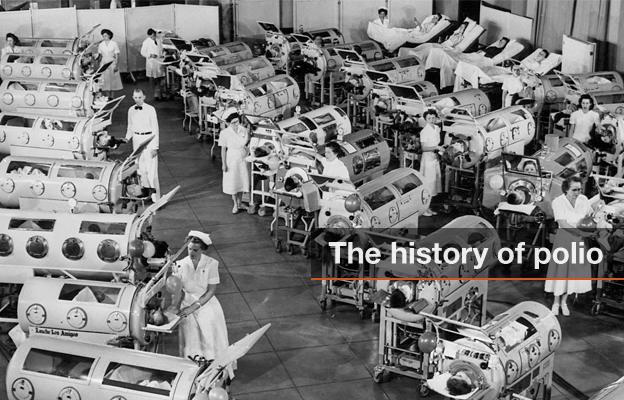
Poliomyelitis has existed as long as human society, but became a major public health issue in late Victorian times with major epidemics in Europe and the United States. The disease, which causes spinal and respiratory paralysis, can kill and remains incurable but vaccines have assisted in its almost total eradication today.
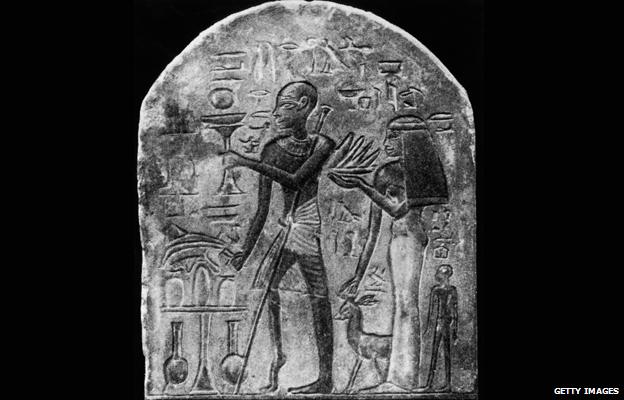
This Egyptian stele (an upright stone carving) dating from 1403-1365BC shows a priest with a walking stick and foot, deformities characteristic of polio. The disease was given its first clinical description in 1789 by the British physician Michael Underwood, and recognised as a condition by Jakob Heine in 1840. The first modern epidemics were fuelled by the growth of cities after the industrial revolution.
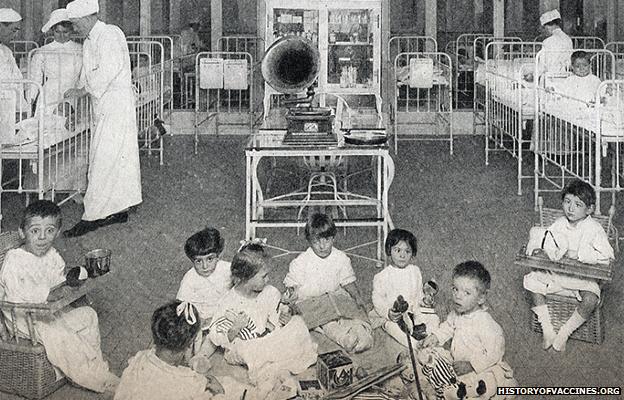
In 1916, New York experienced the first large epidemic, with more than 9,000 cases and 2,343 deaths. The 1916 toll nationwide was 27,000 cases and 6,000 deaths. Children were particularly affected; the image shows child patients suffering from eye paralysis. Major outbreaks became more frequent during the century: in 1952, the US saw a record 57,628 cases.
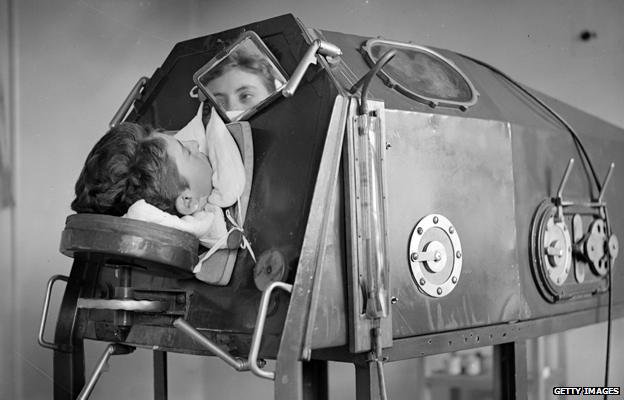
In 1928, Philip Drinker and Louie Shaw developed the "iron lung" to save the lives of those left paralysed by polio and unable to breathe. Most patients would spend around two weeks in the device, but those left permanently paralysed faced a lifetime of confinement. By 1939, around 1,000 were in use in the US. Today, the iron lung is all but gone, made redundant by vaccinations and modern mechanical ventilators.
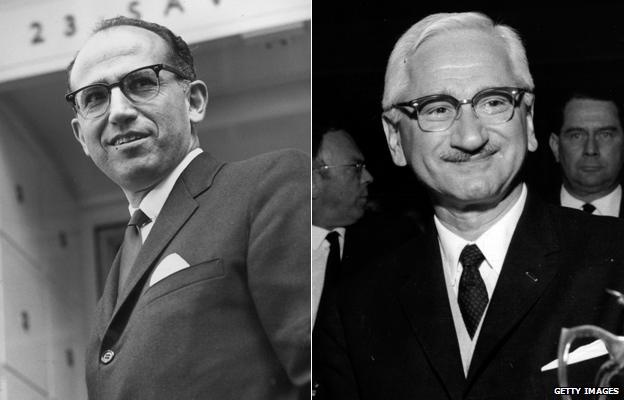
A major breakthrough came in 1952 when Dr Jonas Salk (L) began to develop the first effective vaccine against polio. Mass public vaccination programmes followed and had an immediate effect; in the US alone cases fell from 35,000 in 1953 to 5,300 in 1957. In 1961, Albert Sabin (R) pioneered the more easily administered oral polio vaccine (OPV).
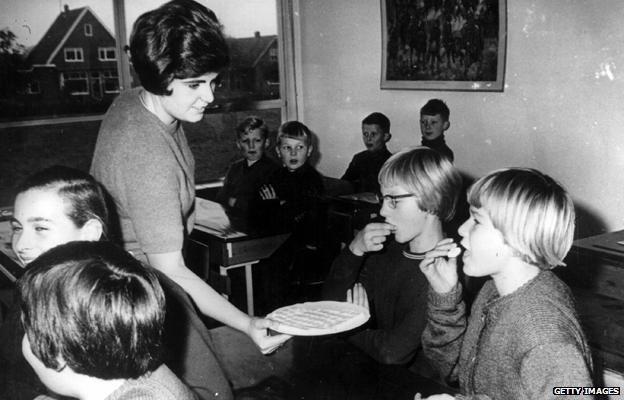
Despite the availability of vaccines polio remained a threat, with 707 acute cases and 79 deaths in the UK as late as 1961. In 1962, Britain switched to Sabin's OPV vaccine, in line with most countries in the developed world. There have been no domestically acquired cases of the disease in the UK since 1982.
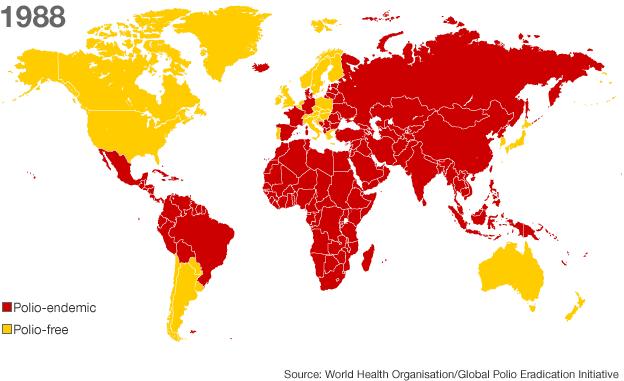
By 1988, polio had disappeared from the US, UK, Australia and much of Europe but remained prevalent in more than 125 countries. The same year, the World Health Assembly adopted a resolution to eradicate the disease completely by the year 2000.
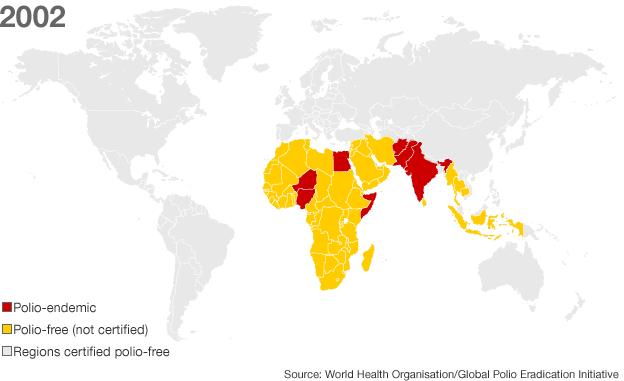
The WHO Americas region was certified polio free in 1994, with the last wild case recorded in the Western Pacific region (which includes China) in 1997. A further landmark came in 2002, when the WHO certified the European region polio-free.
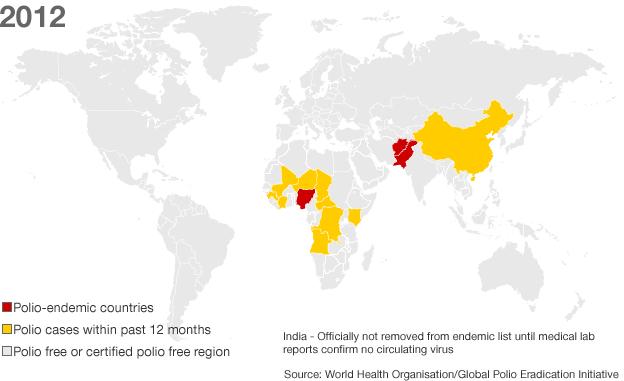
In 2012, Polio remains officially endemic in four countries - Afghanistan, Nigeria, Pakistan and India, which is on the verge of being removed from the list having not had a case since January 2011. Despite so much progress, polio remains a risk with virus from Pakistan re-infecting China in 2011, which had been polio free for more than a decade.
- Published19 December 2012
- Published18 December 2012
- Published26 November 2012
- Published17 October 2012
- Published17 July 2012
- Published24 May 2012
- Published20 February 2012